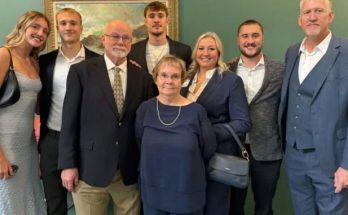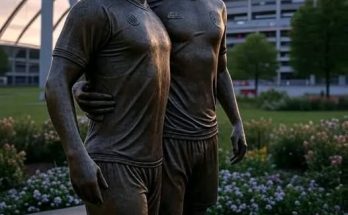From flashing brilliance in Eugene as an Oregon Duck to now donning Celtics green, the college connection of Chris Boucher and Payton Pritchard has come full circle. Their paths first crossed in the 2015-16 season, when Boucher, a lanky shot-blocking machine from Montreal, and Pritchard, a fiery freshman point guard from West Linn, Oregon, helped elevate the Ducks into one of the most exciting teams in college basketball. Nearly a decade later, their careers have taken different trajectories—through the G League, overseas stints, and NBA bench roles—but fate has reunited them in Boston, where their chemistry, forged in the fires of Pac-12 battles, could become an unexpected x-factor for a Celtics team with championship aspirations.
Boucher arrived at Oregon as a junior college transfer, a late bloomer whose basketball journey had been anything but conventional. Growing up in Saint Lucia before moving to Montreal, he didn’t even pick up the sport seriously until his late teens. Yet by the time he reached Eugene, his combination of length, timing, and defensive instincts made him an immediate force. Standing 6’10” with a 7’4” wingspan, Boucher was a human eraser at the rim, swatting shots with an almost casual elegance. But he wasn’t just a defensive specialist—he could stretch the floor with a smooth three-point stroke, a rarity for big men at the time.
Pritchard, on the other hand, was a hometown hero, a four-star recruit who had dominated Oregon high school basketball. From the moment he stepped on campus, he played with a chip on his shoulder, a bulldog mentality that belied his baby-faced appearance. He wasn’t the biggest or the fastest, but his court vision, handle, and fearlessness made him an instant contributor. By midseason, he had wrestled the starting point guard role away from more experienced players, earning the trust of head coach Dana Altman with his poise in crunch time.
Together, they formed a perfect tandem. Boucher’s ability to protect the rim allowed Pritchard to pressure ball-handlers up the court, knowing he had a safety net behind him. Offensively, Pritchard’s playmaking unlocked Boucher’s potential as a pick-and-pop threat, while Boucher’s gravity as a shooter created driving lanes for his young point guard. The Ducks soared to a 31-7 record, winning the Pac-12 regular-season title and tournament before making a thrilling run to the Elite Eight, where they fell just short against Buddy Hield and Oklahoma. That season cemented their bond—not just as teammates, but as brothers who had battled through adversity together.
But their journeys diverged after that magical run. Boucher, despite tearing his ACL in the Pac-12 tournament, earned a two-way contract with the Golden State Warriors, where he became the first player in NBA history to win a championship while on a two-way deal (though he didn’t see playoff minutes). From there, he bounced to the Toronto Raptors, where he slowly carved out a role as a high-energy big off the bench, winning over fans with his shot-blocking and relentless hustle. Pritchard, meanwhile, stayed at Oregon for four years, becoming one of the most decorated players in program history. As a senior, he averaged 20.5 points per game, leading the Ducks to another Pac-12 title and earning conference Player of the Year honors. Drafted by the Celtics in 2020, he spent his early years fighting for minutes behind established stars but never lost his trademark confidence.
Now, in Boston, their reunion is more than just a feel-good story—it’s a strategic advantage. The Celtics’ system under Joe Mazzulla thrives on versatility, ball movement, and defensive intensity, all traits that Boucher and Pritchard embody. Boucher, now 31, brings veteran savvy and a unique skill set as a mobile big who can protect the rim and space the floor. Pritchard, 26, has evolved into a reliable backup guard, capable of igniting the offense with his quick trigger from deep and relentless motor. Their pre-existing chemistry eliminates the usual learning curve that comes with new teammates, allowing them to hit the ground running in pick-and-roll actions and defensive rotations.
In many ways, their games complement each other even better now than they did in college. Boucher’s improved three-point shooting (he shot 37% from deep in his best seasons with Toronto) makes him an ideal partner for Pritchard, who excels at drawing defenders and kicking out to open shooters. Defensively, Boucher’s ability to switch onto smaller players meshes perfectly with Pritchard’s pesky on-ball pressure, creating a nightmare for opposing offenses. And perhaps most importantly, both play with a hunger that reflects their unconventional paths to the league—Boucher, the undrafted late bloomer, and Pritchard, the undersized guard who was always told he wasn’t good enough.
The Celtics’ culture, built on selflessness and toughness, is the perfect environment for their reunion to flourish. Jayson Tatum and Jaylen Brown may be the stars, but championship teams are often defined by their role players—the guys who bring energy off the bench, make the extra pass, and dive for loose balls. Boucher and Pritchard have spent their entire careers proving they belong, and now, they have a chance to do it together on the biggest stage.
Their story is a testament to the enduring power of college bonds. Most teammates go their separate ways after graduation, their connections fading into occasional social media likes or text messages. But for Boucher and Pritchard, the trust they built at Oregon never disappeared. It was there when Boucher cheered Pritchard on from afar during his breakout senior year. It was there when Pritchard texted Boucher congratulations after his NBA milestones. And now, it’s there every time they step on the court together in Boston, a silent understanding that transcends play calls or defensive schemes.
As the Celtics gear up for another playoff push, the reunion of these two Ducks could be one of the season’s most underrated storylines. In a league where chemistry is often as important as talent, having two players who already know each other’s tendencies is a luxury. Whether it’s a perfectly timed backdoor cut, a no-look pass, or a defensive rotation that seems telepathic, their connection will show up in the little moments—the ones that decide close games.
From the raucous crowds of Matthew Knight Arena to the bright lights of TD Garden, Boucher and Pritchard have come a long way. But in some ways, they’re right back where they started: two underdogs, playing with house money, proving that heart and hustle still matter. The jerseys are different, the stakes are higher, but the bond remains the same. And for the Celtics, that might just be the secret weapon they didn’t know they needed.
The NBA season is a marathon, not a sprint, and as the games grow more intense, the value of trust becomes immeasurable. Boucher and Pritchard don’t need time to build that trust—it was forged years ago, in the fires of college basketball’s toughest battles. Now, as they chase a championship together, their journey feels like destiny. From Ducks to Celtics, from teammates to brothers, their story is far from over. If anything, it’s just getting started.



